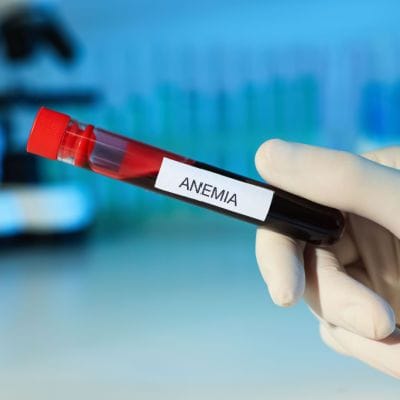 OVERVIEW
OVERVIEW
Anemia is a medical condition resulting in a low red blood cell count. Red blood cells are responsible for supplying your body with oxygen. A lack of oxygen delivered to your body's cells can result in shortness of breath or fatigue, as well as a decrease in the functioning of your tissues and organs.
Affecting approximately 6% of the population in the United States, anemia is a commonly occurring condition.
According to the American Gastroenterological Association, the leading cause of anemia in the world is due to a lack of iron.
What are the Symptoms of Anemia?
Common symptoms of anemia include:
- Fatigue
- Shortness of breath
- Chest pain
- Lack of energy
- Lightheadedness
- Headaches
- Racing heart
- Loss of appetite
- Ringing in your ears
- Cold hands and feet
- Body and joint aches
- Weakness
- Irritability
- Abnormal cravings to eat ice or non food items such as clay or dirt
What are the Causes of Anemia?
There are many different causes of anemia. Some of the most common include:
- Anemia is caused by loss of blood
This can occur with donating blood too frequently. This type of anemia can also occur when you bleed due to:- Menstruation
- Use of certain medications like NSAIDs that can cause gastritis (inflammation of the stomach lining) or the formation of ulcers
- Gastrointestinal disorders like ulcerative colitis, Crohn’s disease and cancers of the digestive tract.
- Anemia caused due to the faulty production of red blood cells
This type of anemia occurs when your body is not producing the appropriate amount of red blood cells, or if it does, there's something wrong with its functioning. Common disorders related to this type of anemia include:
- Vitamin-deficiencies like folic acid, vitamin b12, or copper
- Bone marrow and stem cell disorders like aplastic anemia and thalassemia
- Anemia caused by the destruction of red blood cells
Also known as hemolytic anemia, this type of anemia can happen from birth, or it can occur due to:- Autoimmune diseases including lupus
- Sickle cell disease
- Genetic conditions like thalassemia
- Certain medications
- Infections
- Kidney or liver disease
- Severe heart valve disease
- Transfusion reactions
- Anemia caused by decreased absorption of iron
Sometimes your body can not absorb enough iron, which is used in the production of red blood cells. This can happen as a result of:- Celiac disease
- H. pylori infection
- Autoimmune gastritis
- Previous surgery on the upper GI tract
- Anemia caused by a chronic disease state, such as:
- Chronic kidney disease
- Chronic heart failure
- Chronic lung disease
- Certain cancers
- Rheumatoid arthritis
- Lupus
- Hypothyroidism
- Certain infections
- Obesity
How is Anemia Diagnosed?
A complete blood count (CBC) test will measure your red blood cell levels including hemoglobin, hematocrit, and red blood cell counts. In addition, your doctor will carry out a complete health evaluation.
Other tests that may be carried out during your diagnosis of anemia include:
- Blood smear—to check the shape of your RBCs
- Reticulocyte count—determines the number of immature RBCs in your blood
- Iron, B12, and folate levels
- Sometimes patients require evaluation by a hematologist (blood specialist) for consideration of bone marrow biopsy (tissue samping of the bone marrow which is where blood cells are produced).
- Patients may undergo upper endoscopy or colonoscopy to look for sources of bleeding from the digestive tract
Treatment for Anemia is Safe When Performed by a Board-Certified Gastroenterologist
Treatment for anemia depends on the type or cause of your anemia. The main concept is to treat the underlying disorder causing the anemia. For people with anemia due to vitamin or mineral deficiencies, a change to your diet or the prescription of supplements that include iron, vitamin B12, or folate can help treat your anemia. Depending on the severity of your anemia, iron may need to be given in an IV form. If severe enough, anemia may require a blood transfusion.
Some patients may receive medication to stimulate the production of blood cells in the bone marrow (erythropoietin or erythropoiesis-stimulating agents).
Disclaimer:
The information on this website is provided for educational and information purposes only and is not medical advice. Always consult with a licensed medical provider and follow their recommendations regardless of what you read on this website. If you think you are having a medical emergency, dial 911 or go to the nearest emergency room. Links to other third-party websites are provided for your convenience only. If you decide to access any of the third-party websites, you do so entirely at your own risk and subject to the terms of use for those websites. Neither FLINT GASTROENTEROLOGY ASSOCIATES, PC, nor any contributor to this website, makes any representation, express or implied, regarding the information provided on this website or any information you may access on a third-party website using a link. Use of this website does not establish a doctor-patient relationship. If you would like to request an appointment with a health care provider, please call our office at (810) 603-8415.
 OVERVIEW
OVERVIEW

